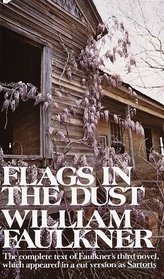Helpful Score: 1
18 OCT 2013 (Fri.) @ ~ 10:00 A.M. EST
Many years ago, at home sick from work, I read William Faulkner's "Sartoris" and thoroughly enjoyed it; but, as I discovered much later, it was only a "cut" version of the original, "Flags in the Dust", which was eventually published in uncut form in the 1950s. This novel, which is not only a drama but also a tale of love and lust, describes Mississippi (and, presumably, the Southern United States) in the 1920s, just after World War I. There are echoes throughout not only of the Great War but also of the Civil War. "Young Bayard" Sartoris returns without his brother, who was shot down in an air battle, and, constantly grieving, persists in indulging in the riskiest of behaviors with no thought of consequences. "Old Bayard", his grandfather, the town's (only?) banker, with whom Young Bayard resides upon his return, is visited every month or so by a contemporary, Will Falls, who lives in the county poorhouse and visits the bank to receive a gift of candy and tobacco and to talk about the past, including his (Mr. Falls's) activities during the Civil War (both elderly men are almost deaf and converse by shouting at one another in the banker's office). A very amusing subtext is the account of a wen on Old Bayard's face: Miss Jenny, his niece, who manages the household for him, insists on taking him to a newly-arrived doctor in town, while Old Bayard actually wishes to visit Dr. Lucius Quintus Peabody, the country doctor (in an adjacent office) who has been serving the county for half a century. Dr. Peabody, hearing Old Bayard's curses, barges into the new doctor's office, and the ensuing scene that takes place is well worth the reading! In the end, over Miss Jenny's almost-violent objections, Will Falls places a salve, inherited from his grandmother (of the Choctaw Indian Nation), onto the wen, and predicts the exact date when, having dried up, the wen will fall off of Old Bayard's face. Meanwhile, Miss Jenny, the niece, insists on taking Old Bayard, by train, to a specialist, accompanied by the young doctor; what happens at *that* appointment is also well worth reading. Byron Snopes, a member of a discreditable family who appear in the lkater novels, is a teller at the bank, and also plays a minor but nontrivial role in this novel. In summary, William Faulkner, in "Flags in the Dust", with both seriousness and humor, introduces many of the characters who appear in his later novels of the fictionalized Yoknapatawpha County. In this fortunately-uncut version, we are at last able to experience, in full, a great work of art. (signed) Edwin Timothy Vaughan
Many years ago, at home sick from work, I read William Faulkner's "Sartoris" and thoroughly enjoyed it; but, as I discovered much later, it was only a "cut" version of the original, "Flags in the Dust", which was eventually published in uncut form in the 1950s. This novel, which is not only a drama but also a tale of love and lust, describes Mississippi (and, presumably, the Southern United States) in the 1920s, just after World War I. There are echoes throughout not only of the Great War but also of the Civil War. "Young Bayard" Sartoris returns without his brother, who was shot down in an air battle, and, constantly grieving, persists in indulging in the riskiest of behaviors with no thought of consequences. "Old Bayard", his grandfather, the town's (only?) banker, with whom Young Bayard resides upon his return, is visited every month or so by a contemporary, Will Falls, who lives in the county poorhouse and visits the bank to receive a gift of candy and tobacco and to talk about the past, including his (Mr. Falls's) activities during the Civil War (both elderly men are almost deaf and converse by shouting at one another in the banker's office). A very amusing subtext is the account of a wen on Old Bayard's face: Miss Jenny, his niece, who manages the household for him, insists on taking him to a newly-arrived doctor in town, while Old Bayard actually wishes to visit Dr. Lucius Quintus Peabody, the country doctor (in an adjacent office) who has been serving the county for half a century. Dr. Peabody, hearing Old Bayard's curses, barges into the new doctor's office, and the ensuing scene that takes place is well worth the reading! In the end, over Miss Jenny's almost-violent objections, Will Falls places a salve, inherited from his grandmother (of the Choctaw Indian Nation), onto the wen, and predicts the exact date when, having dried up, the wen will fall off of Old Bayard's face. Meanwhile, Miss Jenny, the niece, insists on taking Old Bayard, by train, to a specialist, accompanied by the young doctor; what happens at *that* appointment is also well worth reading. Byron Snopes, a member of a discreditable family who appear in the lkater novels, is a teller at the bank, and also plays a minor but nontrivial role in this novel. In summary, William Faulkner, in "Flags in the Dust", with both seriousness and humor, introduces many of the characters who appear in his later novels of the fictionalized Yoknapatawpha County. In this fortunately-uncut version, we are at last able to experience, in full, a great work of art. (signed) Edwin Timothy Vaughan
an early version of Faulkern's Yoknapawtawpha series. Not as well developed as others, but still good.




